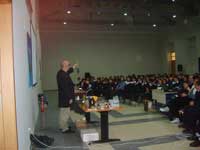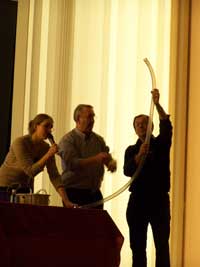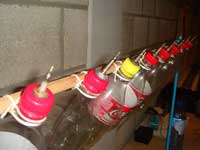Science on Stage: recent activities Inspire article
Sonia Furtado and Marlene Rau report on the news from the national Science on Stage representatives.
Malta

Image courtesy of Chris Schembri
Following the success of their visit in October 2007 (see Hayes, 2008), Dudley Shallcross, Tim Harrison and their outreach team from Bristol ChemLabSw1 returned to the Mediterranean islands of Malta and Gozo in April 2009 for an encore. They were invited to the Mediterranean country by a joint committee of science leaders from church and state schools, which included Chris Schembri and Doreen Mizzi, with whom the Bristol team had first established the collaboration at Science on Stage 2 in 2007, and Tano Bugeja.
Over three days, the ChemLabS team delivered six performances of the demonstration lecture ‘A pollutant’s tale’ to students from state and church secondary schools. A total of 1550 students from 15 schools attended and participated in the talk, by identifying volatile organic compounds by smell – a demonstration that the Bristol chemists use as part of their talk. The shows featured several of the experiments previously published in Science in School, such as the methanol whoosh bottle, the burning of acetylene and the exploding of hydrogen-filled balloons (see Shallcross & Harrison, 2008).
The team also held a seventh, extended session on the topic of climate change for trainee teachers and science undergraduates at the University of Malta.
As always, the performances were a resounding success, as is evident from the reaction of a participating chemistry teacher from Our Lady Immaculate School in Hamrun: “A big thank you for a very interesting and enjoyable event. My students loved it very much and are looking forward to any future ones.” The Bristol chemists will probably be back to Malta to join a science festival planned for November 2009.
Austria
Friday the 13th is thought to be an unlucky day in some countries – not so in Austria, it seems: on Friday 13 March, Science on Stage Austria officially became a non-profit organisation with six members on the board and an advisory committee of twelve, under the name of Science on Stage Austria eVw2. They started preparations to present themselves at a range of events. For instance, you can meet them at the YoTech Event in Viennaw3 and the EXE 09 in Welsw4. The Austrians are also rolling up their sleeves for their own national event, scheduled for 25 and 26 February 2010 at the Johannes Kepler University in Linz.
Belgium

in a tube
Image courtesy of Science on
Stage Belgium

bottles and water
In Belgium, the clocks aren’t standing still either. Science on Stage Belgiumw5 participated in a variety of events throughout the country last spring to promote science and science teaching. They were present with a stand not only at the Expo-Sciences science fairw6 in Brussels, but also at the Centre de Culture Scientifiquew7 science museum in Parentville de Couillet (near Charleroi), where they perform a variety of experiments from all areas of science each year. In addition, they did a great job of complementing an exhibition on light and Antoni van Leeuwenhoek’s microscope at the science museum in Ghentw8, presenting experiments on Young’s law and using the EDUkit for teaching photonics and micro-optics that has been developed by NEMOw9.
For the national science spring fair, Le Printemps des Sciencesw10, which this year was held from 23-29 March under the motto ‘Evolutions – Revolutions’, Science on Stage Belgium ran two workshops in Namur and Mons.
Participants of all ages went on a fun and instructive one-hour journey through physics: they learned about the history of water, were shown a xylophone made of empty bottles and water, learned that infra-red light can be used to listen to music, produced a cloud in a bottle (to try it yourself, see Bultitude, 2009), found out how heavy a litre of air is, and did other entertaining experiments. Some of the experiments can be downloaded from the webw5 in Dutch, French or English.
The next national Playful Science event will take place on 27 February 2010 in the European School in Brussels. More information will be available shortly on the Science on Stage Belgium website.
Germany
On 27 March 2009, the national steering committees from all countries involved in Science on Stage met in Berlin, Germany, and agreed that the project must continue, also at an international level. To this end, they have set up a committee to come up with a strategy. In the meantime, there is a competition to decide who will host the next pan-European event, under the assistance and guidance of Science on Stage Germanyw11, who will share the experience they acquired in the organisation of the international Science on Stage festival in October 2008 (see Furtado, 2009). An important constituent of this successful event was the workshops on a variety of topics from the area of science education. To follow up on this, the work on four of the topics is now being continued by participants from about 15 countries in a series of teacher workshops in Berlin throughout 2009 and 2
References
Bultitude K (2009) Take the weather with you. Science in School 11: 52-57.
Furtado S (2009) Science on Stage: recent international events. Science in School 11: 11-14.
Hayes E (2008) Science on Stage: recent activities. Science in School 10: 4-7. Science on Stage: recent activities
Shallcross D, Harrison T (2008) Practical demonstrations to augment climate change lessons. Science in School 10: 46-50.
Web References
- w1 – For more information on Bristol ChemLabS and their activities, see: www.chemlabs.bris.ac.uk
- w2 – Find out more about Science on Stage Austria eV online: www.scienceonstage.at
- w3 – To learn more about the 2009 Yo-Tech events in Vienna and Graz, see: www.yo-tech.at
- w4 – Find out more about Exe 09 in Wels on: www.nawi4you.at
- w5 – To learn more about Science on Stage Belgium, see: www.scienceonstage.be
- w6 – The organisers of Belgium’s Expo-Sciences fair in Brussels and Liège have their website here: www.jsb.be
- w7 – Find out more about the Centre de Culture Scientifique science museum in Parentville de Couillet here: www.ulb.ac.be/ccs
- w8 – The website of the Ghent science museum can be found here: www.sciencemuseum.ugent.be
- w9 – To find out more about NEMO, the Network of Excellence on Micro-Optics, and their EDUkit.
- w10 – To learn more about the Belgian science spring fair, see: www.printempsdessciences.be
- w11 – Visit the website of Science on Stage Germany here: www.scienceonstage.de





